Two years ago ETA announced a permanent end to its armed struggle, and there is no sense of any violent conflict here now – though there are many large political demonstrations. As yet, however, there have been no moves towards decommissioning of arms, as there was in Northern Ireland, and relationships between the Basque ‘abertzale’ (nationalist) left and the Spanish government are nowhere near as positive as they were in Ireland between Sinn Fein, Ireland and the Blair government.
In part, this is because of the reactionary intransigence of the Spanish hard-line right wing government (although to be fair the left-wing government that preceded it was not much better in this respect). However, it’s also in part because ETA is in a far weaker position than Sinn Fein was, since the Basque Country already has pretty much everything that Northern Ireland achieved through its peace process – i.e. a very substantially devolved regional government giving the region a great deal of democratic autonomy. In fact, the Basque Country has more autonomy, since it (alone amongst the Spanish autonomous regions) has fiscal autonomy too.
There’s also a fair amount of scepticism about how permanent the ceasefire is, since ETA has announced permanent ceasefires before and they have not lasted (though this has lasted longer than others and seems more stable). A few weeks ago, ETA released a statement denouncing the lack of progress that has been made in negotiations with Spain following its ceasefire. This certainly reads as a genuine cry of frustration, but there’s no doubt that it has vaguely threatening overtones too.
Whatever one might feel about ETA, it does seem as though the Spanish government is not responding as open-mindedly as it might to ETA’s overtures – and that it has barely set a foot right in the Basque conflict since the end of the Franco regime nearly 40 years ago.
At the heart of the current conflict is the question of the Basque prisoners – a huge issue that has very substantial support across the Basque Country. Hundreds of people imprisoned because of their involvement in ETA are held in prisons in France and Spain, deliberately many hundreds of miles from the Basque Country, meaning that families have to travel long distances to visit them. The authorities, of course, want to keep the prisoners well away from local networks. Now that ETA has announced its ceasefire, there is huge public support for the campaign to bring them ‘back home’ (‘etxera’) to local prisons.
Flags hang from windows all over the Basque Country in protest at the situation, demanding that the prisoners return ‘etxera’ – and ‘etxera’ is the chant you hear at all manner of political and cultural events.
There have been many massive demonstrations about this over the last few years, including three in Bilbao since we have been here (one happening today) – and many others throughout the Basque Country. This picture of the last major demonstration in Bilbao, in January, gives an indication of how massive it was:
First, it’s important to recognize that not all Basque nationalists are separatists: some are happy with autonomy rather than independence. Second, it’s important to recognize that most left-wing nationalists do not support the extreme-left terrorist tactics of ETA. Third, not all Basque nationalists are left-wing – far from it; the main nationalist party (PNV) is in fact centre-right, and Basque nationalism began in the 19th century as a xenophobic right-wing movement with a somewhat fascist philosophy (though it has moved a long way from that position in the last century.) Fourth, there has been a massive anti-ETA campaign amongst Basques of all political views.
It’s also very important, however, to recognize the widespread grievances that exist against Spain, many of which date back to the brutal suppression of the Basque Country during Franco’s time, pre-1976 – some aspects of which continued even after Franco’s death. The Spanish army and police attacked the Basques violently in the transitional period after Franco’s death, and even today are felt by many to be a potential threat. Furthermore, there have been and continue to be many reports of torture and maltreatment of Basque prisoners and suspects by the Spanish state, which have fed these grievances; the Spanish government’s banning of pro-independence left-wing parties (especially the popular Batasuna) which are suspected of being in sympathy with ETA has certainly not helped things and is again widely perceived as a breach of democratic rights.
Although there is little direct support for ETA, there is a great deal of support for many of ETA’s aims, and ETA is in some senses deeply embedded in the community throughout Euskadi: there is no ‘other side´ in the Basque country as there is in Northern Ireland, where the fight is between catholic and protestant extremists. Many Basque people will no doubt know or be related to someone who has been involved with ETA in some way, or will be involved socially and politically around the edges of the extreme left – drinking and socializing in the gritty working class nationalist bars called ‘Herriko Tabernas’ (‘Homeland Bars’) that are found all over the Basque Country – even if they actually have nothing to do with ETA.
And whatever one feels about nationalism, one has to recognise that nationalist sentiment of all kinds is VERY powerful and widespread here for all kinds of reasons. The strength of communal feeling for Basque identity and culture is palpable throughout Euskadi, and often very moving (I've written about this in previous posts). And socially progressive, left-wing nationalism is particularly powerful here because of the way the Basques, the gritty Northerners, have been oppressed by right-wing Madrid establishments over the last century and more. You can see here of course echoes of the relationship between England and N. Ireland, and between England and Scotland, and between London and the industrial north of England – but the Basque cause is distinguished by its severe oppression by fascism during the Franco years.
Everything has to be understood against a background of unresolved tensions following the Spanish Civil War and the long rule of the Franco regime. Many in Spain feel that the fascists who thrived under Franco have never had to pay the price for their crimes, nor has there ever been any truth or conciliation process. Many of the fascists continued, and still continue, to hold positions within the Spanish government and military. (See Giles Tremlett’s excellent book ‘The Ghosts of Spain’ for much more on this.)
And there is one other issue that has the potential to unite the different shades of Basque nationalism against the Spanish: the question of self-determination. Whether they believe that the Basque Country should be independent or not, whether they are left or right wing nationalists, many people believe that the Basques should at least be given the choice via a referendum, something the Spanish government refuses to allow, saying that it is against the Spanish Constitution – a constitution that the majority of Basques do not consider themselves to have ratified, since most abstained or voted against it in the 1978 referendum on it. Only 35% of the electorate in the Basque Country supported the new constitution.
Why did the majority of Basques reject (or abstain in the vote on) the constitution when it offered them the substantial autonomy that they now have? Right-wingers, as I understand it, objected particularly to the proposal to make Navarra into a separate autonomous region rather than part of a united Basque region (see previous post on Pamplona for further detail on this). Left-wingers objected for a wide variety of reasons. Aiartza and Zabalo (2010) report that there were five main unresolved issues:
· Amnesty for Basque prisoners (still unresolved)
· Legalisation of pro-independence parties (still unresolved)
· Withdrawal of Spanish police force (* There has since 1982 been an autonomous Basque police force, the Ertzaintza, but it is widely regarded by the left as a puppet of the Spanish state).
· Acceptance of the right to self-determination, including Navarra as part of a Basque state (still unresolved)
· Improvement of working class conditions in the Basque Country
but of course their political objections were far broader than this list indicates.
So where does this leave us? With limited access to the locals, we haven’t been able to have many in-depth discussions with them about these issues, but what we see around us is a region in which the Basques have a very large amount of autonomy, and freedom to express their culture, language, politics and identity, in a way similar to Wales and Scotland – and in some ways even more so, since they also have considerable fiscal independence (such as tax-gathering powers). We see what appears in many ways to be a well-balanced society in which nationalism is, at least in urban multicultural areas, inclusive and progressive. Many people we’ve spoken to are happy with this situation, and suspicious of more fundamentalist nationalism.
We are also strongly aware, however, of the very real grievances many of the Basques have against a Spanish state that still behaves reprehensibly, the pain of recent Basque history, and the powerful cultural, linguistic and historical arguments for an independent Basque state – more powerful in many ways than any of the British nations (or, at risk of being controversial, even than Catalunya).
It’s a complex state of affairs, and all we can do is keep trying to understand it. I’ve been reading a fair amount of general stuff on Basque history and culture, and in an effort to try to understand what we see around us, I’ve read the following academic reports on the Basque Conflict:
The Basque Country: the Long Walk to a Democratic Scenario by Urko Aiartza and Julen Zabalo (Berghof Conflict Research, Transitions Series No 7, Berlin 2010)
Keys to Understanding the ETA’s Permanent Ceasefire by Sandra Chapman (Lokarri, Bilbao 2012)
Basque Country Conflict Map (University of St Andrews, Centre for Peace and Conflict Studies 2010)
We’ve also watched a couple of really interesting films about it, both thoroughly recommended. La Pelota Vasca is a documentary which simply presents voices from all sides, taking the metaphor of the Basque game Pelota as a symbol of the conflict. It’s ten years old, now, so it is a bit out of date, but it nevertheless gives a very good overview of the situation. Gazta Zati Bat is a more recent (and more entertaining) film which focuses on the question of self-determination rather than the question of independence, and follows a grass-roots political movement in Euskadi which initiates a cultural and political exchange between Scottish and Basque nationalists – cue lots of amusing film of Scottish and Basque country sports, folk music and dancing, etc., as well as explorations of the shared politics of independence referenda….
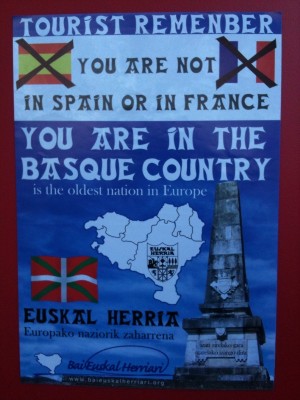
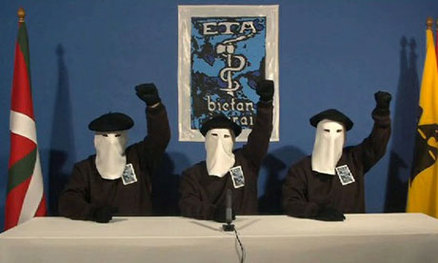
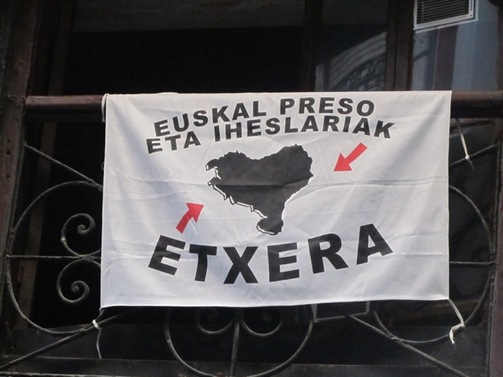
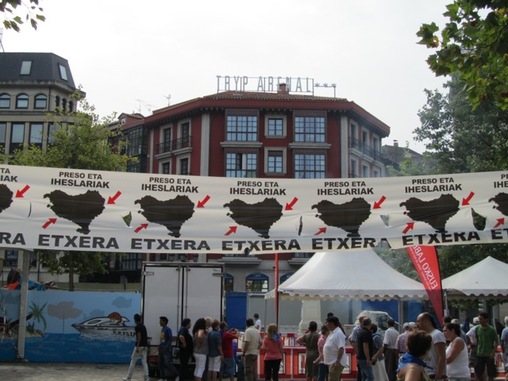
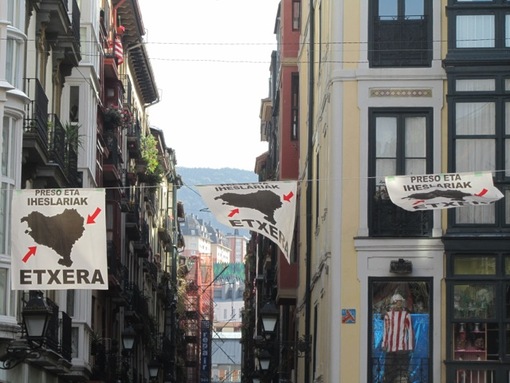
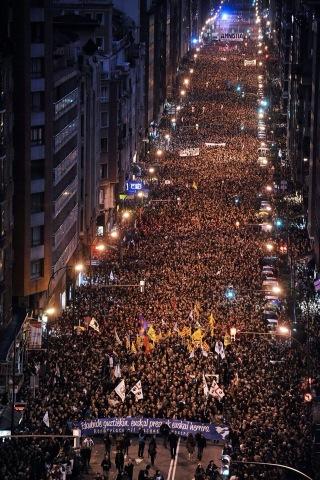
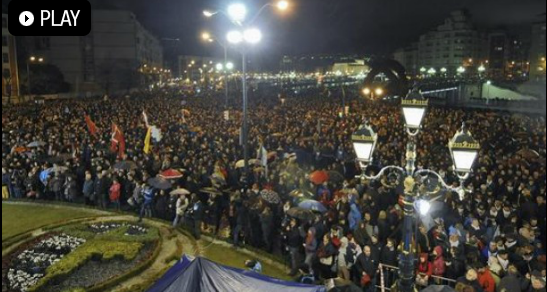
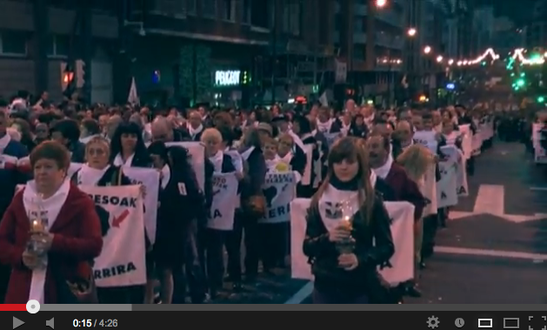
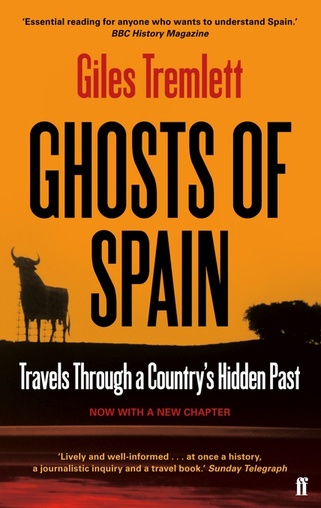
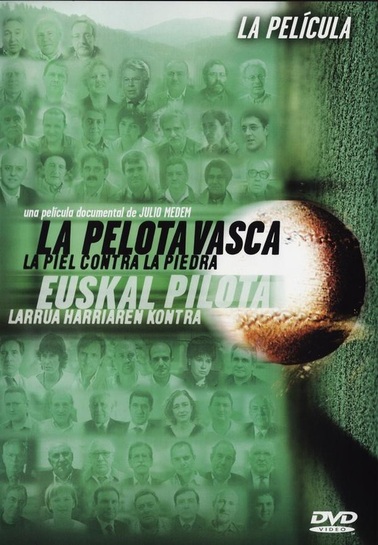

 RSS Feed
RSS Feed